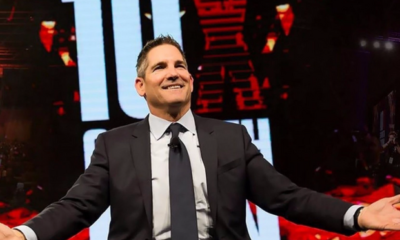Entrepreneurs
These 5 Entrepreneurs Share Their Best Advice They’d Give to Their Younger Selves
What do you wish you knew when you first started as an entrepreneur? Was there a misstep you took that set you back? We can all relish on what it was like when we first started. There were probably many ups and downs, along with good and bad memories.
Picture yourself sitting in a room with your eighteen-year-old self. You decide to walk up to yourself and you’re going to give them the best piece of advice on what it takes to start a successful business. That’s exactly what the entrepreneurs in this article did.
Below, 5 entrepreneurs share the advice they would give their younger selves:
1. Jay Papasan
Jay Papasan is a best-selling author who has co-authored the books, The One Thing, and The Millionaire Real Estate Agent. Jay works as vice president and executive editor at Keller Williams.
While looking back, Jay said he wishes he was clear from the start on what he was trying to accomplish. He realized that his intentions weren’t clear early on in his career. People say they want to become successful, but what does that mean? Everyone has a different version of what it means to become successful. What is your version of success?
By getting clear on what you want, you can break down your goals. You can start with a five-year goal and break it down into a weekly goals you need in order to achieve the bigger one. Nonetheless, you can’t set a five-year goal if you don’t know what you’re actually trying to chase. Be clear on what you want and then start taking massive action.
“I believe the last thing I read at night will likely manifest when I’m sleeping. You become what you think about the most.” – Daymond John
2. Bedros Keuilian
Bedros Keuilian is a renowned fitness business expert and CEO of Fit Body Boot Camp, the world’s fastest growing gym chain. When you’re the founder of the world’s fastest growing gym chain, you will be under enormous amounts of stress. You can either let that stress eat you up or you can do something about it.
Bedros learned from an early age that the best way to deal with the stress is through working out. He’s taken this idea to heart and works out every day. This doesn’t have to be hitting the gym, it can be as simple as doing yoga or a quick run, anything that’ll help release your stress and allow you to come back better than before.
3. Alan Burak
Alan is the founder of the renowned investment firm, Never Alone Capital, where he specializes in helping every day traders understand the power of options. Alan learned early on, especially in the investment world, that where you put your focus, energy will flow.
When the crash of 2007-08 happened, Alan could’ve had a negative energy flow, but he knew there was money to be made. No matter what your situation is, there’s never a reason to be negative.
In most situations, they are the cause of your own fault. Life shouldn’t be easy because if there was predictability, it wouldn’t be interesting. Deal with the highs and lows that come with being an entrepreneur.
If you don’t like the job you’re working or a client screwed you over, what can you do to better your situation? Do you think complaining about your previous client will help? Of course not! You could use your time to prospect new clients. When you’re positive, positive events will appear in your life but, don’t forget the same can be said if you’re negative.
4. Grant Cardone
Grant Cardone is a New York Times Best-Selling Author, creator of Grant Cardone TV, CEO of four businesses, and currently has over $400 million worth of real estate holdings.
If you’ve never heard of Grant Cardone, he has an amazing story. I don’t want to play spoiler too much but when he was in his twenties, Grant was addicted to drugs. He inevitably turned his drug addiction into working on his business. Grant understood the power of addiction if you’re using it the right way.
Everyone is addicted to something whether that be their phone, working out, or even drugs. Take those addictions and put it towards your work. Instead of checking your phone when you wake up, use that time to read a book or put time in your business.
Most people want to complain about their situation without making the necessary changes to improve their lives. Addictions don’t have to be bad. Use any addiction you have right now and put it towards the work you’re trying to accomplish.
“There’s no shortage of money, only of people thinking big enough.” – Grant Cardone
5. Andy Frisella
Andy Frisella is the founder of Supplement Superstores, Paradise Distribution, and the renowned fitness brand 1st Phorm International. His companies combined, bring in more than $100 Million Per Year.
Andy dropped out of college to start his supplement store. He wishes he would’ve known that he didn’t have to undercut his prices to become successful. Andy would cut his prices and the result of that was he could barely make a profit.
If someone came into his store and purchased $400 worth of items, he’d give them 20% off because $400 was a lot of money to him. However, just because $400 was a lot of money for Andy, doesn’t mean it was to his customer.
When you’re creating a product or service, never discount your price because you never know how much your customer would pay. Your views on money won’t match up to someone else’s views.
I want you to think back on your younger-self. What do you think you would’ve said to him or her? How do you think your life would’ve changed if what you know now, you knew back when you were first starting? Let us know in the comments below!
Change Your Mindset
The Silent Skill That Makes People Respect You Instantly
What truly earns respect and why most people go about it the wrong way

Everybody craves respect but not everyone earns it. Some people believe that a title, years of experience, or a position of authority automatically entitles them to respect. (more…)
Entrepreneurs
The Essential Skills Every Entrepreneur Needs In 2026
Success in the digital age isn’t about luck. It’s about mastering the skills that separate dreamers from doers.

When I was 22 years old, I started my first side hustle as a ghostwriter. (more…)
Business
The Hidden Money Pit in Your Operations (and How to Use It)
See how smart asset management software is quietly saving businesses thousands in wasted time, stock, and maintenance.

Trimming unnecessary expenses and minimizing resources is a general practice in running a business effectively. Asset management software can help you achieve those goals. (more…)
Business
Thinking of Buying A Business? These 6 Sectors Quietly Produce the Best Deals
Before you buy your next venture, check out the sectors where successful businesses are changing hands every day.

All entrepreneurs have a desire to be the masters behind a successful venture. Buying an established business is a great choice for many. This provides instant access to an established market with existing infrastructure and clients. (more…)
-

 Health & Fitness1 week ago
Health & Fitness1 week agoWhat Minimalism Actually Means for Your Wellness Choices
-

 Did You Know7 days ago
Did You Know7 days agoWhy Most Online Courses Fail and How to Fix Them
-

 Business1 week ago
Business1 week agoIf Your Business Internet Keeps Letting You Down, Read This
-

 News3 days ago
News3 days agoBrandon Willington Builds 7-Figure Business by Ignoring Almost Everything


























1 Comment